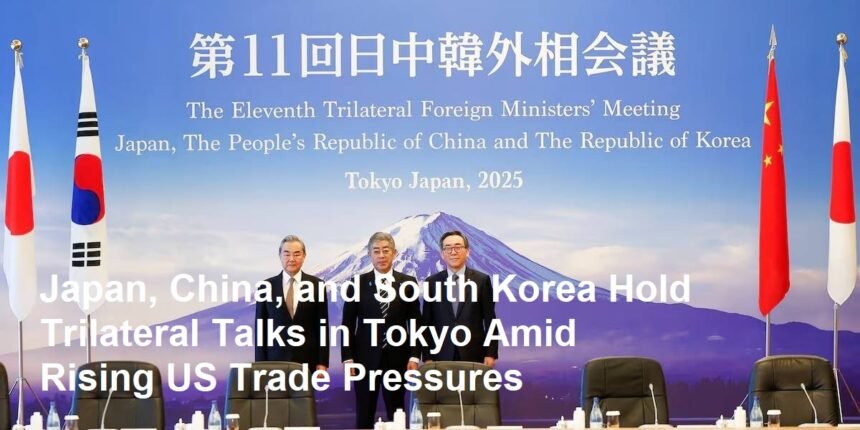Tokyo, March 22 — The foreign ministers of Japan, China, and South Korea convened in Tokyo on Saturday to discuss strengthening economic cooperation and addressing shared challenges, as escalating U.S. trade tariffs threaten to disrupt stability in the Indo-Pacific region. The meeting, the first trilateral dialogue in over four years, highlighted the urgency for Northeast Asian powers to recalibrate their strategies amid growing global economic uncertainties.
Focus on Economic Resilience
Japanese Foreign Minister Yoko Kamikawa, Chinese Foreign Minister Wang Yi, and South Korean Foreign Minister Cho Tae-yul emphasized the need to deepen collaboration in trade, technology, and supply chain security. The talks come as the Biden administration intensifies efforts to curb China’s technological advancement through export controls and tariffs, measures that risk collateral damage to Japan and South Korea, both key U.S. allies.
“Our three nations must work together to foster an open, rules-based economic order while safeguarding our collective interests,” Kamikawa stated during a joint press conference. Wang Yi echoed this sentiment, stressing that “unilateral protectionism” — a veiled reference to U.S. policies — undermines global growth. Cho Tae-yul added that South Korea seeks “practical solutions” to ensure regional industries remain competitive.
US Tariffs Cast a Shadow
The U.S. recently announced steep tariffs on electric vehicles (EVs), semiconductors, and renewable energy products, primarily targeting China but indirectly impacting Japanese and South Korean firms embedded in Chinese supply chains. For instance, South Korea’s semiconductor giants, which supply critical components to Chinese manufacturers, face mounting pressure to diversify production bases. Similarly, Japanese automakers worry that retaliatory measures from Beijing could disrupt their access to China’s EV market, the world’s largest.
Analysts argue that the trilateral dialogue reflects a pragmatic shift. “These countries are caught between their security ties with the U.S. and economic reliance on China. Cooperation among them is a survival tactic,” said Kenji Hashimoto, a political economist at Waseda University.
Beyond Economics: Regional Security and Climate
While economic issues dominated the agenda, the ministers also addressed security tensions, including North Korea’s missile tests and territorial disputes in the South China Sea. Wang Yi reiterated China’s opposition to “external interference” in regional affairs, likely alluding to U.S. military partnerships with Japan and South Korea. Meanwhile, Kamikawa and Cho emphasized the importance of maintaining peace in the Taiwan Strait, a flashpoint that could destabilize global trade routes.
Climate cooperation emerged as another key theme. The trio pledged to accelerate clean energy initiatives, including joint research on hydrogen technology and carbon-neutral manufacturing. This aligns with broader Asian goals to reduce dependence on fossil fuels, though critics note that China’s coal-heavy energy mix remains a hurdle.
Historical Tensions and Future Prospects
The meeting marked a cautious thaw in relations after years of friction. Japan-South Korea ties, strained by wartime history and trade disputes, have improved since Seoul and Tokyo resolved a compensation feud over forced labor in 2023. Meanwhile, China’s aggressive posturing in the East China Sea and its support for North Korea continue to test trust.
Despite these challenges, economic imperatives are driving reconciliation. Combined, the three nations account for over 24% of global GDP and 20% of world trade. A joint statement released after the talks outlined plans to resume regular leader summits, suspended since 2019, and expand cultural exchanges to rebuild goodwill.
The Road Ahead
The ministers agreed to hold a trilateral leaders’ summit later this year, though no date was confirmed. Observers warn that sustained progress will require balancing competing interests. For Japan and South Korea, aligning too closely with China risks alienating the U.S., their primary security guarantor. Conversely, China seeks to leverage economic interdependence to weaken American influence in Asia.
As the U.S. doubles down on protectionism, the Tokyo meeting underscores a pivotal reality: in an era of great-power rivalry, middle powers like Japan and South Korea are forging their own paths to resilience. Whether this trilateral partnership evolves into a lasting framework — or buckles under geopolitical strain — will shape the future of Asia’s economic and security landscape.












